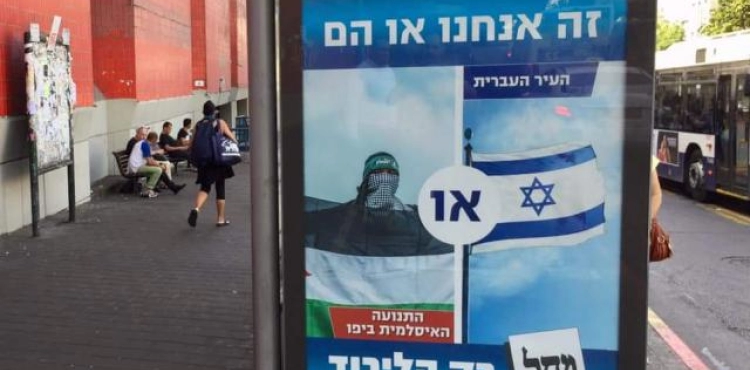Palestinians do not pin hopes on the upcoming Israeli election on April 9, despite their results affect their lives.
"We hope there will be solutions to live in peace and security, but our experience as Palestinians from the history of the Israeli elections shows that we are often the fuel for these elections," said Tayseer Barakat, 58, on a Ramallah street.
"It is likely that there will be no meaningful changes, because the hope that things will get new and the situation will change," Barakat said, adding that "we always feel that we are victims of the Israeli elections."
Leaders of the Israeli government coalition agreed to hold early Israeli elections after it was in November, after the government headed by Benjamin Netanyahu, the most right-wing in Israel´s history, experienced several crises.
Some Palestinians are concerned that the Israeli election campaign will provoke more incitement in Israel against Palestinians and Arabs in general.
The Palestine Institute of Public Diplomacy recently published a report showing examples of hate speech in Israeli society against the Palestinians.
"It seems to me that incitement and hatred are becoming more normal in Israeli society," said Salem Brahman, executive director of the institute.
"The campaign speech of many Israeli politicians seeks to strip an entire people of its humanity."
In the last elections in 2015, Netanyahu sought to stimulate his right-wing base by warning on election day that Israeli Arabs were going to the polls "in large numbers", a comment he later apologized for.
The bilateral Palestinian-Israeli negotiations have seen several complications since the 1993 peace accord, the latest of which was the freezing of negotiations under Netanyahu in 2014.
The Palestinian Authority insists on its demand to halt Israeli settlement activity in the Palestinian territories and release the last batch of detainees held by Israel before the Oslo Accords as a condition for resuming negotiations. Israeli settlements in the West Bank from the perspective of the international community are illegal.
All the estimates were likely to win the Likud Party headed by Netanyahu, despite the accusations of corruption around him, but is now facing a real competition from the list of center headed by former Chief of Staff Benny Gantz. Gantz declared his openness to the withdrawal of settlers from some settlements in the West Bank, but did not mention the two-state solution at all.
"Until this moment, we do not see any major differences between the right and the centrist party," said Salah Raafat, a member of the executive committee of the Palestine Liberation Organization. "They are proposing unified Jerusalem and continued settlement and control over the Jordan Valley."
"There are no alternative forces to end the occupation and establish peace with the Palestinians," he said, adding: "We certainly hope that another prime minister who looks forward to peace with the Palestinian people will come and not impose sanctions on the Palestinian people."
Palestinian relations with the current Israeli government reached its worst, when the government recently announced, by a decision of the Israeli Knesset, cutting off a percentage of the tax funds that Israel collects for the Palestinian Authority. This money goes to the families of the detainees in Israel on security charges or to the families of martyrs. Against Israeli targets.
More than 600,000 Israelis live in settlements in East Jerusalem and the West Bank.
"Elections may contribute to changing the status quo in Israel, but for the Palestinians they are outside this framework," says Hafez al-Barghouthi, the editor of a former newspaper.
"There is no Israeli party that talks about the Palestinian cause, and if they speak, with a ferocious occupation tone, such as: Arabs must be killed, Arabs must be expelled, no state for the Palestinians or limited autonomy under Israeli sovereignty."
"Right, center and left agree to ignore the Palestinian issue, focus more on the legitimization of marijuana, and poison the Israeli people with what they say about terrorism and the Arab threat."
He points to the current focus of election campaigns in Israel on "intimidation of the Iranian threat," reiterating "they have no political project to raise on the Palestinian issue."
Gantz´s comments about the possibility of withdrawing from the occupied West Bank drew criticism from the right, while the Palestinians found it encouraging, but demanded further clarification.
The head of the "Israeli immunity" party, Benny Gantz, spoke in an interview on the Israeli security issue as a central issue. "We are not looking for control over anyone, and we have to find ways to avoid controlling other people," he said.
He did not explicitly mention the West Bank, and declined to specify any conditions for the possibility of withdrawal from the Palestinian territories.
Gantz committed to keep the strategic Jordan Valley area on the West Bank of the Jordan River, as well as occupied East Jerusalem.
"The disengagement plan was carried out on the initiative of a legitimate government headed by the Likud, and Netanyahu and the Likud leaders voted on it, and in the Gantz government there will be no unilateral actions related to the evacuation of settlements," Gantz said after the interview was published.
Israeli elections are taking place amid continued Palestinian division between Fatah and Hamas, which has divided the Gaza Strip, which is controlled by Hamas.












